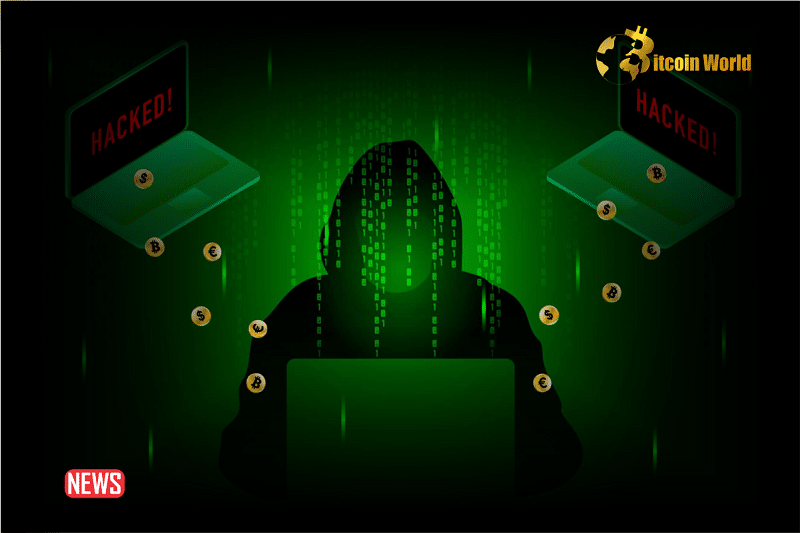Buckle up, crypto enthusiasts! November turned out to be another rollercoaster month in the digital asset world, but not the kind we usually cheer for. Instead of price pumps, we witnessed a surge in something far less desirable: crypto hacks. Blockchain security firm PeckShield dropped a bombshell, revealing that a staggering $350 million vanished into thin air across 28 separate incidents in November alone. And guess who seems to be at the heart of a significant chunk of this digital mayhem? None other than crypto personality Justin Sun.
November witnessed an upsurge in crypto hacks & exploits as crypto hackers stole nearly $350M across 28 incidents.
The cumulative losses from crypto exploits in 2023 have reached ~$1.37B.
Notably, Nov is the 2nd month with the largest amount of losses in 2023. pic.twitter.com/Q5jRk98pBf
— PeckShieldAlert (@PeckShieldAlert) November 30, 2023
This makes November the second-highest month for crypto heists in 2023, just trailing behind September’s massive $356 million loss. To put things in perspective, October saw a comparatively meager $32.47 million stolen. It’s clear: crypto security remains a critical, and often vulnerable, aspect of the industry.
By the end of November, the total losses from crypto exploits in 2023 have ballooned to a concerning $1.37 billion. Where did a large portion of this stolen loot originate? Let’s dive into the details.
Justin Sun’s Ecosystem: A Hacker Hotspot?
Here’s where things get particularly interesting, or perhaps alarming, depending on your perspective. A significant $236 million of the November hacks – nearly 70% of the total stolen funds – originated from platforms linked to Justin Sun. We’re talking about projects like Poloniex, HTX (formerly Huobi), and the HECO Bridge.
Let’s break down the incidents:
- Poloniex ($100 Million Hack): On November 10th, crypto exchange Poloniex, acquired by Justin Sun back in 2019, suffered a major security breach. A staggering $100 million was siphoned off. Adding an unusual twist, reports indicate the attackers used some of the stolen funds to pump up the price of Tron’s native TRX token.
- HTX and HECO Bridge (Over $100 Million): Not long after the Poloniex incident, Justin Sun himself confirmed that HTX and HECO Bridge were also targeted. Early reports suggested losses exceeding $100 million from these platforms.
To address the aftermath, Justin Sun announced plans to compensate affected users, promising to cover the losses incurred due to these exploits. This move, while reassuring to users, underscores the severity of the security lapses experienced by these platforms.
Read Also: Circle Denies Ties With Justin Sun, Involvement In Terrorism Financing
Beyond the Sunverse: Other Notable Crypto Hacks in November
While projects associated with Justin Sun grabbed major headlines due to the scale of losses, they weren’t the only victims in November’s hacking spree. Other significant incidents included:
- KyberSwap ($55 Million Drain): Decentralized exchange KyberSwap experienced a hefty $55 million loss due to an exploit.
- Kronos Research ($26 Million API Key Breach): Taipei-based crypto trading firm Kronos Research fell victim to unauthorized access of its API keys, resulting in a $26 million loss.
- dYdX, Raft, Onyx, and Others ($25 Million Combined): Decentralized exchange dYdX, along with Raft Protocol, Onyx Protocol, and several other projects, collectively lost around $25 million to various exploits.
- USDT Phishing Attack ($27 Million Loss for a Single Victim): In a stark reminder of the human element in crypto security, a single individual was tricked into a phishing scam, losing a massive $27 million in Tether’s USDT.
Key Takeaways from November’s Crypto Hack Avalanche
November’s crypto hack statistics paint a concerning picture. What can we learn from this surge in exploits?
- Security is Paramount, Always: This isn’t a new lesson, but it’s one that needs constant reinforcement. For crypto platforms, robust security measures are not optional; they are existential. Users entrust these platforms with their assets, and breaches of trust can have devastating consequences.
- Centralized Exchanges Remain Targets: Despite the rise of DeFi, centralized exchanges like Poloniex and HTX continue to be prime targets for hackers due to the large volumes of assets they hold.
- DeFi is Not Immune: KyberSwap and other DeFi protocols on the list demonstrate that decentralization doesn’t automatically equate to security. Smart contract vulnerabilities and other attack vectors remain a threat.
- API Key Security is Critical: The Kronos Research hack highlights the importance of securing API keys. These keys provide access to sensitive systems and must be protected with utmost care.
- Phishing Remains Effective: The $27 million USDT phishing victim serves as a stark reminder that social engineering attacks are still incredibly effective. User education and vigilance are crucial in preventing such losses.
- Justin Sun’s Platforms Under Scrutiny: The concentration of hacks within Justin Sun’s ecosystem raises questions about the security protocols and infrastructure of these platforms. Increased scrutiny and potentially enhanced security measures are likely needed.
- Compensation is a Double-Edged Sword: While Justin Sun’s commitment to compensate users is commendable, it also raises questions about the long-term sustainability of such practices and whether it might inadvertently incentivize lax security.
Looking Ahead: Fortifying the Crypto Fortress
November’s crypto hack spree is a wake-up call for the entire industry. It underscores the ongoing battle between innovation and security in the digital asset space. While the promise of cryptocurrency and blockchain technology remains bright, incidents like these highlight the critical need for continuous improvement in security practices, user education, and proactive threat detection. As the crypto landscape evolves, so too must our defenses against those who seek to exploit its vulnerabilities. The stakes are high, and the fight for a secure crypto future is far from over.
Disclaimer: The information provided is not trading advice, Bitcoinworld.co.in holds no liability for any investments made based on the information provided on this page. We strongly recommend independent research and/or consultation with a qualified professional before making any investment decisions.




